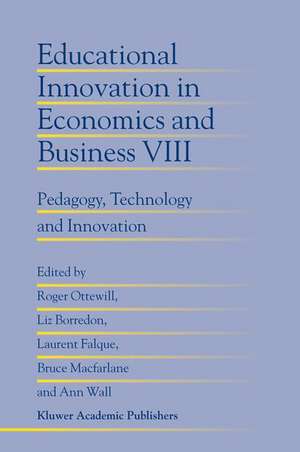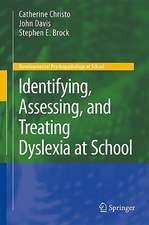Educational Innovation in Economics and Business: Pedagogy, Technology and Innovation: Educational Innovation in Economics and Business, cartea 8
Editat de Roger Ottewill, Liz Borredon, Laurent Falque, Bruce Macfarlane, Ann Wallen Limba Engleză Hardback – 31 dec 2003
| Toate formatele și edițiile | Preț | Express |
|---|---|---|
| Paperback (1) | 950.66 lei 6-8 săpt. | |
| SPRINGER NETHERLANDS – 5 dec 2010 | 950.66 lei 6-8 săpt. | |
| Hardback (1) | 960.93 lei 6-8 săpt. | |
| SPRINGER NETHERLANDS – 31 dec 2003 | 960.93 lei 6-8 săpt. |
Preț: 960.93 lei
Preț vechi: 1171.86 lei
-18% Nou
Puncte Express: 1441
Preț estimativ în valută:
183.89€ • 192.23$ • 155.39£
183.89€ • 192.23$ • 155.39£
Carte tipărită la comandă
Livrare economică 06-20 martie
Preluare comenzi: 021 569.72.76
Specificații
ISBN-13: 9781402017872
ISBN-10: 1402017871
Pagini: 401
Ilustrații: XXIII, 401 p. 1686 illus.
Dimensiuni: 155 x 235 x 12 mm
Greutate: 0.89 kg
Ediția:2004
Editura: SPRINGER NETHERLANDS
Colecția Springer
Seria Educational Innovation in Economics and Business
Locul publicării:Dordrecht, Netherlands
ISBN-10: 1402017871
Pagini: 401
Ilustrații: XXIII, 401 p. 1686 illus.
Dimensiuni: 155 x 235 x 12 mm
Greutate: 0.89 kg
Ediția:2004
Editura: SPRINGER NETHERLANDS
Colecția Springer
Seria Educational Innovation in Economics and Business
Locul publicării:Dordrecht, Netherlands
Public țintă
ResearchCuprins
I: The Business Context.- How E-Learning Businesses Meet Client and End User Needs: Analysing the Collaborative Contexts.- Business Process, Experience and Memory: Educational Approaches and Technology Tools for a Global Workforce.- II: Challenges for the Academy.- From High Level Clarity to Ground Level Confusion: Exactly Where do IT-Mediated Education Policies Fit?.- Moving a University Toward On-line Learning: Opportunities, Challenges, and Technologies.- Linking Pedagogical Innovation and Information Technology to Enhance Business Education.- The Experience of Self-Organized Learning Through the Use of Learning Plans for Knowledge Management.- III: Team and Collaborative Learning.- Using Student Consulting Team Assignments as a Vehicle to Teach a Systems Development Course.- Using Team Learning in the Classroom: Experiences and Lessons.- Using Teams in the Classroom: Meeting the Challenge of Evaluating Students’ Work.- International Management: Early Experience in Multicultural Virtual Team Interaction.- IV: Problem Based Learning.- PRAXIS: A Practice-Based Instructional System in the First Year of an Industrial Engineering Program.- Using the Web for Problem-Based Learning.- Effects of Problem-Based Learning in Business Education: A Comparison Between a PBL and a Conventional Educational Approach.- Learning about Teaching Information Systems in a Problem-Based Curriculum: An Exploratory Study of the Impact of Students’ Individual Differences on their Conception and Perception of Problem Tasks.- V: Distance and On Line Learning.- The Use of a Virtual Learning Environment to Support Learners on Work-Based Learning Programs.- Distance Learning: The Experience of Accounting at the University of Natal (Durban), South Africa.- Creating and Improving a “VirtualObject” Through Web-Mediated Discourse.- Testing Social Information Processing Theories in Distance Education.- VI: Specific Applications of Learning Technology.- Electronic Tutorial for Moral Reasoning in Business Education: A Technological Learning Tool to Facilitate Students’ Moral Reasoning.- The Five Key Benefits of On-line Final Examinations (with Three Free Bonus Benefits).- Assertion-Reason Assessment in Formative and Summative Tests: Results from Two Graduate Case Studies.- Exploring the Implications of Videoconferencing for Management Learning.






















